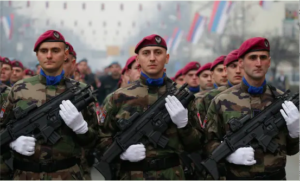 Throughout Danis Tanovic’s Oscar-winning film “No Man’s Land,” a viewer waits distressingly for the bouncing mine to explode below the body of Cera, an injured Bosnian soldier lying in a trench. The last moments of this antiwar satire do not capture a real ending for the story — or the Bosnian war: Cera was left behind motionless by the departing UN blue helmets.
Throughout Danis Tanovic’s Oscar-winning film “No Man’s Land,” a viewer waits distressingly for the bouncing mine to explode below the body of Cera, an injured Bosnian soldier lying in a trench. The last moments of this antiwar satire do not capture a real ending for the story — or the Bosnian war: Cera was left behind motionless by the departing UN blue helmets.
Tanovic’s movie also depicts the disheartened departure of a curious TV crew, hungry for breaking news. Unlike the UN peacekeepers, reporters were oblivious to the fate of the soldier left behind in a ditch. In a non-fiction plot, Bosnia and Herzegovina is kept equally alive and motionless with the real ticking time bomb that can explode and blow everything in the vicinity.
Two Paths
For a dozen years now, the Balkan state has been plodding along two gloomy paths, heading for a dangerous collision. On one hand, Russia’s collusion with local proxies is destabilizing the liberal vision of collective security within the context of future Euro-Atlantic integration. Russia also continues to be the only state opposing the Peace Implementation Council (PIC) in Bosnia and Herzegovina and its steering board’s communiqués, including the last statement from June 3 this year.
On the other hand, the Bosnian Serb-majority entity, Republika Srpska, is reversing the peace process while simultaneously courting Russia as an ally. Its nationalism, kept away like a genie in a bottle due to pressure from the European Union and American unipolar dominance, has managed to free itself from captivity. Thus, the Serb member of the rotating Bosnian presidency, Milorad Dodik, once hailed as a “breath of fresh air” by former US Secretary of State Madeleine Albright, has held at least 10 official consultations with Vladimir Putin over the last several years.
During his second consecutive meeting with the Russian president in the midst of the 2014 Ukraine crisis, Dodik shared his unequivocal affiliation with Moscow: “Naturally, there is no question that we support Russia. We may be a small and modest community, but our voice is loud.”
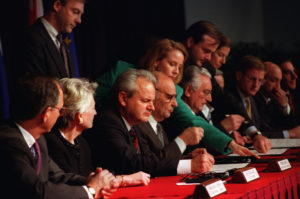
This trajectory with opposing power dyads within the Bosnian state is often lamented as a nightmare for the Dayton Peace Agreement that put an end to the bloody Yugoslav War in 1995 and kept the country in one piece. Dayton is dead; Bosnia and Herzegovina is “sleepwalking” into another Balkan crisis; it is on the brink of collapse; its president wants to break up his own country; goodbye Bosnia and Herzegovina, welcome Republika Srpska’s exit — these are just some grim headlines that suggest nightmare scenarios.
However, most experts on the subject rarely discuss wider security dilemmas of this critical geopolitical divergence, namely the Bosnian Serbs’ effective breakaway from both Bosnia and Herzegovina and the West. Unlike the two times Russia played a limited hand effectively — and, as some would argue, defensively — in Georgia and Ukraine, the Kremlin’s subversion of Europe’s soft underbelly is essentially an offensive posture that possibly inflicts fatal damage on the already shaken Euro-Atlantic pillars: liberal order, Euro-Atlantic integrity and European security.
Should the EU fail to protect its mission in Bosnia and Herzegovina, ensuing turmoil will eventually turn into a great-power rivalry. If the perilous trajectory in Bosnia and Herzegovina is allowed to proceed unrestricted, the West needs to fasten its seatbelts and brace for impact.
Slippery Slope
The Bosnian Serbs’ secessionist direction is not a given, but the slope is a slippery one. A unilateral breakaway would effectively tear apart Bosnia’s postwar constitutional order of two entities, the Federation of Bosnia and Herzegovina and Republika Srpska, and other political and institutional arrangements that have gradually restored peace and security over the last 25 years. The Serb secession would also signal an existential threat to the survival of a multiethnic state and the Bosnian people in particular.
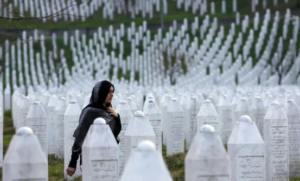 Similar past attempts to impose Serb hegemony over Bosnia and Herzegovina in the early 1990s had disastrous consequences and resulted in more than 100,000 deaths, 2.2 million refugees and displaced persons, culminating with genocide in Srebrenica in July 1995. Since pro-Bosnian authorities in Sarajevo want to protect the liberal multicultural order and see the EU and the US as preferred allies, it is only natural for them to expect appropriate reactions from the Euro-Atlantic community.
Similar past attempts to impose Serb hegemony over Bosnia and Herzegovina in the early 1990s had disastrous consequences and resulted in more than 100,000 deaths, 2.2 million refugees and displaced persons, culminating with genocide in Srebrenica in July 1995. Since pro-Bosnian authorities in Sarajevo want to protect the liberal multicultural order and see the EU and the US as preferred allies, it is only natural for them to expect appropriate reactions from the Euro-Atlantic community.
On the other hand, a secessionist party would also face a critical struggle. Its immediate insecurity stems from the NATO-trained Bosnian army across the Inter-Entity Boundary Line (IEBL) that currently subdivides Bosnia and Herzegovina into two administrative units. As Republika Srpska’s political leadership largely opposes the liberal multicultural order and looks to Russia as a preferred ally, it would also rely on Moscow for political and military support.
Republika Srpska’s collision with a Bosnian-led government would probably escalate from threats and barricades along IEBL to larger-scale clashes that a small number of UN-mandated EUFOR troops will hardly deter. In a vicious cycle, Bosnia could eventually end up in pre-Dayton chaos that, in the early 1990s, also included the Bosnian Croat component and its own secessionist aspirations.
Serbia, which shares a long border with Bosnia and Herzegovina and nationalist sentiments with the secessionist movement, is probably the first contender to be caught in the Bosnian fire for both internal and external reasons. In its substance, patronizing Bosnian Serbs has continued since the time when Slobodan Milosevic was at the pinnacle of his power in the early 1990s. Patriarch Irinej of the Serbian Orthodox Church, for example, proclaims that borders between Serbia and Republika Srpska do not exist. Serbia’s academics also view Serbia’s national borders as temporary frontiers.
As Serbia’s confidence grew over time, emboldened by the return of Russia to the Balkan theater and by China’s global rise, Belgrade became more assertive in its behavior. Within months of the joint Serbian-Russian Slavic Shield military display in October 2019, Serbia’s defense minister, Alexander Vulin, announced, among other strategic objectives, the intent to defend the Serb entity in Bosnia and Herzegovina. Serbia’s new national defense strategy thus transcends national boundaries, marking a shift from defensive sovereignty to a more offensive approach.
At the same time, Serbian President Aleksandar Vucic is the only politician from the region, if not the whole of Europe, who has held more bilateral consultations with President Putin than Dodik. The Kremlin’s transcript from the last meeting between Vucic and Putin on June 23 exposes Russia’s views that two countries were developing “pragmatic but still very special and very good allied relations.”
Structural Realities
What Serbia does in Bosnia and Herzegovina pales in comparison with a much larger geopolitical dilemma. For Belgrade, now is a turning point to choose a side between the liberal West and the authoritarian East. Its official policy of neutrality and simultaneous flirting with NATO on one hand, and Russia and China on the other, may no longer be sustainable. As the rationale goes, other powers besides the United States, primarily Russia and possibly China (to a lesser extent), will enlarge their soft-power or military footprints in the regional subsystem sooner rather than later.
Other structural realities also encourage a more aggressive trajectory from Belgrade. First, Serbia has accelerated its military build-up at a faster rate than its neighbors. According to Global Fire Power, its current defense budget is almost twice that of Bosnia and Herzegovina, Albania, Northern Macedonia, Montenegro and Kosovo combined.
Second, Serbia’s reliance on the Russian and Chinese military to balance neighboring NATO members such as Croatia, Bulgaria or Romania has also been reinforced. In 2019, Serbia received Russian donations of MIG-29 fighter jets, T-72 tanks and BRDM-2MS armored vehicles. A short deployment of the S-400 air defense system on Serbian soil also raised American eyebrows. This year, Serbia purchased, at Putin’s suggestion, the Pantsir S-1 air defense system. It also bought CH92-A drones and FK-3 surface-to-air missiles from China and kept talking about new arms.
Third, Serbia can hardly benefit from the liberal European order in the Balkans except through EU membership, which seems to be a third-rate priority at the moment according to some academic voices in Belgrade. By siding with Russia and the Slavic Shield, however, Belgrade still aspires to redefine its borders, reclaim Kosovo (or at least part of it), possibly reestablish preponderance in Montenegro, Northern Macedonia and Bosnia and Herzegovina, and, eventually, become a Balkan hegemon.
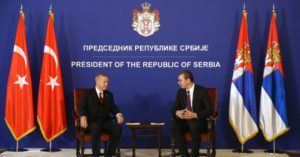 Turkey would also become entangled in the nightmare of a new Bosnian disorder. On one level, the foreign policy objectives of Turkey and other NATO allies are compatible with almost all critical issues in the western Balkans. Turkey maintains its policy that international borders of the newly independent states in the region, following declarations of independence by Montenegro in 2006 and Kosovo in 2008, have become definite. In Bosnia in particular, Turkey is among 20 contributing countries of EUFOR, providing deterrence and contributing to a safe and secure environment. Ankara is also on the same page with the US and EU members in the PIC and its steering board’s communiqués that Russia usually opposes.
Turkey would also become entangled in the nightmare of a new Bosnian disorder. On one level, the foreign policy objectives of Turkey and other NATO allies are compatible with almost all critical issues in the western Balkans. Turkey maintains its policy that international borders of the newly independent states in the region, following declarations of independence by Montenegro in 2006 and Kosovo in 2008, have become definite. In Bosnia in particular, Turkey is among 20 contributing countries of EUFOR, providing deterrence and contributing to a safe and secure environment. Ankara is also on the same page with the US and EU members in the PIC and its steering board’s communiqués that Russia usually opposes.
On another level, Turkey projects its soft power throughout the Balkans, particularly in Bosnia and Herzegovina, relying on historical, cultural and personal ties. This year, it allocated €30 million ($36 million) to revamp and modernize the Bosnian armed forces. Turkey can also leverage its strategic partnership with Serbia to deter the latter from taking a more belligerent stance.
However, in the event of a collision in Bosnia, having military spending 10 times that of Serbia, Turkey would probably oppose Serbian offensive behavior in the region. Ankara also represents an important geopolitical substitute for the Bosnian people should the EU, EUFOR and NATO decide to abandon their commitments to safeguarding peace, security and liberal order in Bosnia and Herzegovina. Their immediate and complete withdrawal from Bosnia, which is less probable, would also invite other extra-regional actors to fill the vacuum, in which case power relations would inevitably become subject to reconfiguration and different visions for both Bosnia and Herzegovina and southeastern Europe would have to emerge.
This scenario could set Turkey and Russia on a collision course because Vladimir Putin perceives Republika Srpska and Serbia as natural, historic and strategic allies. At a minimum, the Turkish double track toward Russia would have to pass an additional test. At the same time, these two countries possess formidable mediation capacity with confronting parties in the Bosnian theater that some European powers would oppose on geopolitical — and the more liberal ones on ideological — grounds.
Our European Home
As Russia’s Foreign Minister Sergei Lavrov tweeted this summer, “Our common European home needs serious reconstruction if we want all of its residents to live in prosperity.” The Kremlin, so the perception goes, seeks to reshape the liberal Euro-Atlantic order in Russia’s image and for its own benefit. Second, Moscow is also interested in replacing the US-mandated hierarchic order in Europe with an unknown, but certainly more anarchic, multipolar structure. But Bosnia and Herzegovina is not on the Russian border, and its inclusion in the NATO structure does not pose any meaningful threat to Moscow.
However, Republika Srpska’s secession from a country that lacks NATO’s Article 5 mutual defense guarantee presents yet another opportunity for Russia to become more influential on the European stage at the cost of the Euro-Atlantic order.
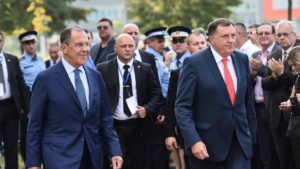 At first sight, a local collision in Bosnia and Herzegovina would bear a striking resemblance to what transpired in Ukraine in 2013-14. Ukraine was forcefully divided along similar geopolitical and domestic lines between pro-European aspirations in Kyiv on one hand, and secessionist tendencies by the pro-Russian minority in the east on the other. However, Bosnia’s instability is far more dangerous than the crisis in Ukraine for two structural reasons, largely ignored so far. First, in Republika Srpska, Putin’s prospects are of the highest geopolitical value, namely having a loyal proxy ready to do Moscow’s bidding, not in Russia’s near abroad like Ukraine, but deep within the EU’s external borders.
At first sight, a local collision in Bosnia and Herzegovina would bear a striking resemblance to what transpired in Ukraine in 2013-14. Ukraine was forcefully divided along similar geopolitical and domestic lines between pro-European aspirations in Kyiv on one hand, and secessionist tendencies by the pro-Russian minority in the east on the other. However, Bosnia’s instability is far more dangerous than the crisis in Ukraine for two structural reasons, largely ignored so far. First, in Republika Srpska, Putin’s prospects are of the highest geopolitical value, namely having a loyal proxy ready to do Moscow’s bidding, not in Russia’s near abroad like Ukraine, but deep within the EU’s external borders.
Second, Russia’s penetration within NATO’s eastern borders also challenges Pax Americana and a 70-year-old alliance system in Europe. The latter represents a deep incursion into the system protected and deeply rooted in American and European liberal values. In that context, the nature of Russia’s disruptive behavior in Bosnia no longer remains defensive but becomes an offensive act against the West.
Some may argue that Russia’s aims are less relevant. What matters is Moscow’s capability to project soft and hard power. In this regard, skeptical analysts largely question Russia’s ability to challenge the United States in the Balkans. Their typical reference is domestic weakness and Russia’s stagnating economy, with an annual GDP that is smaller than Italy’s. However, other great power credentials such as its sheer size, nuclear weapons capability, vast natural resources and an impressive cyber weapons arsenal enable Russia to punch above its weight on the world arena, keeping Europe and NATO vigilant.
As Russia has shown with the annexation of Crimea in 2014, it won’t shy away from using its extraordinary military readiness for limited ends without fear of unintended consequences. Eventually, it was effective at projecting military power in areas where the Euro-Atlantic community was reluctant to do so. Bosnia and Herzegovina, vulnerable as it may be, provides an easy target for Russia, offering Moscow the best chance to keep the West in retreat.
Opposing Power Dyads
This trajectory with opposing power dyads within the Bosnian state brings challenging dynamics for the European Union too. From the inside, the EU’s multitasking operations in Bosnia and Herzegovina would have to pass their stress test. From the outside, likely incursions of other illiberal powers in Brussels’ backyard would ostensibly place the two opposing sides on a collision course.
A major dilemma for the EU lies between a strong multilateral reaction to protect a collective peace-building legacy and unilateral moves by individual member states to pursue their national interests. The EU’s first viable option would be to increase EUFOR’s symbolic military mission to protect order and address the grievances of local communities. As Kurt Bassuener wrote in Foreign Affairs last year, the current mission can’t defend itself against any growing uncertainty with “an institutional fig leaf of 600 troops,” “much less fulfill the mandate of the Dayton accords.”
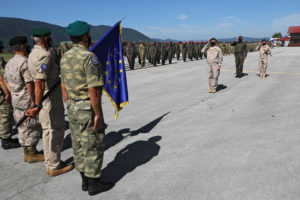 Should the EUFOR contributing states strengthen their capacity and act decisively within NATO’s interoperability mechanisms, the Bosnian crisis would probably not escalate. In this regard, EUFOR’s annual military exercises — which airlift reserve forces and combine them with EUFOR’s permanent troops, armed forces of Bosnia and Herzegovina and local law enforcement agencies — are of critical importance.
Should the EUFOR contributing states strengthen their capacity and act decisively within NATO’s interoperability mechanisms, the Bosnian crisis would probably not escalate. In this regard, EUFOR’s annual military exercises — which airlift reserve forces and combine them with EUFOR’s permanent troops, armed forces of Bosnia and Herzegovina and local law enforcement agencies — are of critical importance.
An alternative scenario with dire consequences would be to evacuate EUFOR troops from Bosnia altogether. This is what happened when the Dutch battalion, under the jurisdiction of the United Nations Protection Force, pulled out from Srebrenica in July 1995, mocking the UN resolutions on safe heavens and allowing Serb extremists — today convicted war criminals — to proceed unabashedly with genocide. Such a reaction would deprive Bosnia of European military presence and set in motion a rapid geopolitical change, allowing regional and extra-regional actors to take advantage and fill the vacuum.
If that happens, the ability of Brussels to extend stability and project soft power in the region would be severely weakened, if not completely diminished. This prospect, before long, compels particular EU member states that simultaneously live in two parallel worlds — one liberal and one increasingly illiberal — to make their final ideational preference. It also provokes complex and dangerous dynamics given opposing threat perceptions between those member states that border Russia and a few others that explore interest-based partnerships with Moscow.
Undercurrents of this anxiety might have already surfaced when French President Emmanuel Macron spoke of the necessity to reopen “a strategic dialogue” with Russia, tweeting that Russia was a “threat” but “no longer an enemy” and “also a partner on certain topics.” Things may get extremely complicated if populist EU leaders choose to decouple from the US and the transatlantic security umbrella. Hungary’s decision to permit the transit of Russian military equipment to Serbia last year signaled an early warning that some member states are ready to circumvent common rules and jeopardize common security.
Hence, a powerful trigger such as a new Bosnian crisis would elevate Europe’s threat perceptions to such proportions that the United States would have to rescue the alliance and its central position within it. This resonates with the poor historical record of the EU in conflict management in ex-Yugoslavia, despite much more favorable geopolitical realities in the early 1990s. With an exception of a short war in Slovenia, the EU demonstrated neither effectiveness nor capacity in preempting the bloodshed in 1991.
Eventually, European leaders failed miserably in Bosnia, prompting a peace treaty to be negotiated and drafted in the US rather than Europe. Should this failure be repeated, the third consequential choice for the EU will be to pass the buck on to Washington, in which case this regional small-nation turmoil would transform into a great-power rivalry.
Most Dangerous of All Moods
Addressing the US Senate on the American mission in Bosnia and Herzegovina at the end of 1995, then-Senator Joe Biden made a powerful statement: “Europe cannot stay united without United States. There is no moral center in Europe. When in the last two centuries had the French, or the British or the Germans … moved in a way to unify that continent to stand up to this kind of genocide?” He went on: “I am not here to tell you if we do not act, it will spread tomorrow and cause a war in Europe or next year, but I am here to tell you within the decade, it will cause a spread of war and a cancer and the collapse of Western alliance.”
Human agency aside, structural forces would also be at play and would likely determine Washington’s preferred move. First, the US is still — by all realist and neorealist accounts, such as annual defense spending, global GDP share, population growth rate and geography — more powerful, wealthier and more influential relative to any potential competitor in the international system. Even by the logic of those who support a more restrained foreign policy, with US primacy still intact in Europe, American policymakers would continue to be attracted to liberal hegemony and more so to the existing grand strategy in the European subsystem where the US is not only unchallenged but is largely accepted as benevolent.
The US is also a rational actor that makes calculations regarding its position in a changing regional and international order. Washington understands well that Russia’s unchecked incursion so close to NATO’s eastern border would damage American-led liberal order and alliance structure and, at the same time, change the regional — and possibly even the European — balance of power to the detriment of the United States.
This brings us to what the historian Michael Howard calls “the most dangerous of all moods,” in which the US would not accept a relegation “to the second rank” in the European subsystem. So far, no US administration has shown any intention to leave Europe as a vital area of America’s global footprint in which it had invested a vast amount of blood and money over the past century. In reality, US military presence has essentially increased in Europe in recent years, bringing in more troops, investment and exercises.
 The US military also supports the peace-building process in Bosnia and Herzegovina. On this 25th anniversary of the Dayton Accords, it conducted a bilateral air support exercise with Bosnian military forces using two F-16 fighter planes. So, locking, loading and bombing the party that disrupts American-led order in southeastern Europe on Russia’s behalf is not only possible, but could even become probable.
The US military also supports the peace-building process in Bosnia and Herzegovina. On this 25th anniversary of the Dayton Accords, it conducted a bilateral air support exercise with Bosnian military forces using two F-16 fighter planes. So, locking, loading and bombing the party that disrupts American-led order in southeastern Europe on Russia’s behalf is not only possible, but could even become probable.
Great powers usually do not show much interest in fighting over the squabbles of small nations. However, history is full of exceptions, when minor disputes over isolated issues have dragged great powers into quagmires. Interestingly enough, such regrettable dynamics are best illustrated in the Balkans. A minor dispute in 435 BC between the city-state of Corinth, allied with Sparta, and the city-state Corcyra, allied with Athens, soon led to a larger conflict, eventually trapping the great powers of Athens and Sparta into the Peloponnesian Wars that devastated the Athenian empire, exhausted Sparta and shattered the cultural landscape of Ancient Greece.
What took place in Sarajevo on June 28, 1914, was another striking incident that triggered a chain of adverse reactions that set the whole of Europe, and then the world, on fire. Bosnia and Herzegovina is again a danger zone on the European geopolitical map where competing opponents face the pressures of being bogged down in protracted rivalries due to rapidly shifting power dynamics. Such settings create a space for a modern-day Gavrilo Princip to fire his bullet and trigger a chain of regrettable events.
Hence, not stemming the Serb breakaway from the Dayton mandate, from both Bosnia and Herzegovina and the wider Western liberal order, would be tantamount to allowing a ticking time bomb to go off. Paradoxically, this threat comes at a time when the Balkan region has a good chance to institute a viable order, secure lasting peace and fulfill its Euro-Atlantic aspirations. The decision is there for the taking.
 Dr Emir Hadzikadunic is a Senior Research Fellow at the Islamic Renaissance Front and a former Ambassador of Bosnia & Herzegovina to Malaysia.He holds a PhD in International Relations from the International University of Sarajevo. His extensive experience in international relations and foreign policy includes professional service as Ambassador of Bosnia and Herzegovina to the Islamic Republic of Iran (2010-2013) and Malaysia (2016-ongoing), lecturing and guest-lecturing at the International University of Sarajevo and other universities in South East Europe, Malaysia and Singapore. .
Dr Emir Hadzikadunic is a Senior Research Fellow at the Islamic Renaissance Front and a former Ambassador of Bosnia & Herzegovina to Malaysia.He holds a PhD in International Relations from the International University of Sarajevo. His extensive experience in international relations and foreign policy includes professional service as Ambassador of Bosnia and Herzegovina to the Islamic Republic of Iran (2010-2013) and Malaysia (2016-ongoing), lecturing and guest-lecturing at the International University of Sarajevo and other universities in South East Europe, Malaysia and Singapore. .

